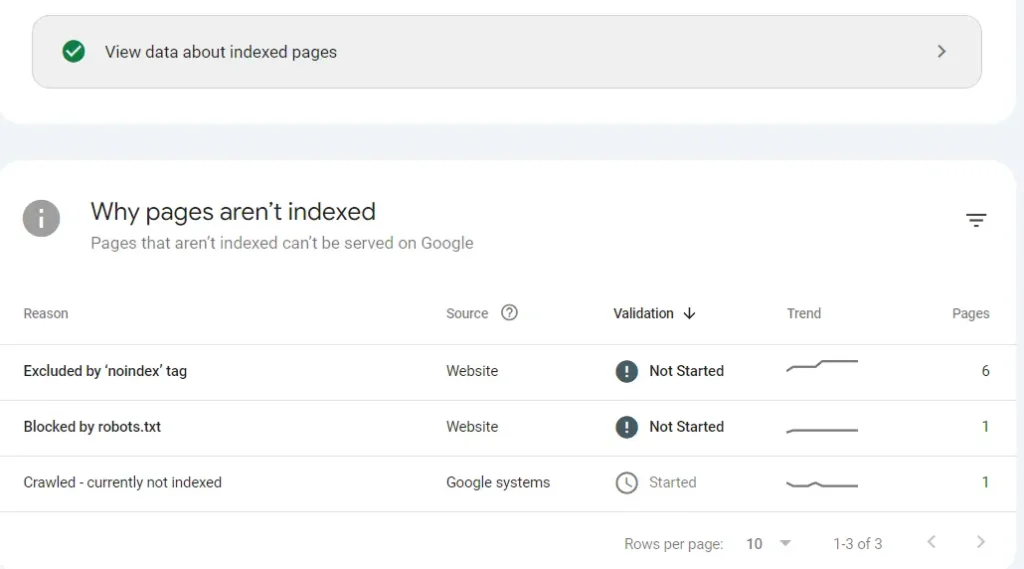A few years ago, I decided to upgrade my old laptop.
It had become slow and unreliable, so I cleaned up files, removed unnecessary programs, and installed a new operating system.
This thorough check revealed hidden issues like malware and outdated drivers. Without this, I wouldn’t have known what was truly wrong.

Similarly, it’s frustrating when a website you’ve poured your heart into isn’t performing well.
SEO audits are like that laptop check-up—they uncover hidden problems that can hinder your site’s success.
Here are the reasons why an SEO audit is important and how you can use these insights to your advantage.
Table of Contents
ToggleUncover Hidden Technical Issues with Your Website.
Imagine you’ve just baked a beautiful cake
On the outside, it looks perfect—golden brown, beautifully decorated, and enticing.
But when you cut into it, you realize it’s undercooked in the middle.
Frustrating, right?
This is how it feels when your website looks great but doesn’t perform as expected.
An SEO audit is like slicing into that cake to check if it’s baked all the way through.

It helps uncover hidden issues that might be affecting your site’s performance.
For instance, there could be broken links scattered throughout your pages, like little potholes on a smooth road, disrupting the user journey.
Or perhaps your page load speed is lagging, causing visitors to abandon your site before it even fully loads—like waiting too long for a cake to bake.
During one audit I performed for a client, I discovered that their mobile version was riddled with issues.
Images weren’t loading properly, and the navigation menu was hard to use on a phone screen.
These hidden problems were driving mobile users away, impacting their overall traffic and sales.
Just as you wouldn’t serve an undercooked cake, you don’t want your website to serve up a subpar experience.
An SEO audit digs deep, revealing technical issues like:
These are like dead ends for users and search engines, stopping them in their tracks.
If your site is slow, users will leave before they even get a taste of your content.
With more people browsing on their phones, it’s crucial that your site works seamlessly on all devices.
Just like ensuring a cake is fully baked, a thorough SEO audit ensures your website is in top shape, ready to delight visitors, and performs well in search results.
Recommended reading: How To Do a Technical SEO Audit: Insights from My Experience.
Enhance Your On-Page SEO
Think about the last time you hosted a dinner party.
You carefully planned the menu, set the table, and made sure every detail was perfect.
Your guests appreciated the effort, and the evening was a success.
Now, imagine your website as that dinner party—on-page SEO is all about making sure everything is perfectly set up to impress your visitors and search engines alike.
When I first started working on my own website, I thought having great content was enough.
But then I realized that just like a dinner party, presentation matters.
That’s where on-page SEO comes in.
It’s the process of optimizing individual pages on your site to rank higher and earn more relevant traffic in search engines.
For example, I once helped a client who had excellent blog posts but wasn’t seeing much traffic.
When I performed an SEO audit, I found that their meta descriptions and title tags were either missing or poorly optimized.
These elements are like the place cards at your dinner table—they guide your guests (or in this case, search engines) to the right places.
Here’s how you can enhance your on-page SEO:
These are the appetizers of your site. They give a taste of what’s inside and entice visitors to click through. Make sure each page has a unique and compelling title tag and meta description that include relevant keywords.
Think of these as the courses in your meal. They organize your content into digestible sections, making it easier for both users and search engines to understand.
This is the main course. Your content should be high-quality, relevant, and valuable to your audience. It should naturally incorporate keywords without feeling forced, providing a satisfying experience for your readers.
These are like the side dishes that complement your main course. Internal links help guide visitors through your site, keeping them engaged and helping search engines understand the structure of your content.
Here are some of the great articles on how you can enhance your on-page SEO.
From Semrush – On-Page SEO: What It Is and How to Do It
From Hubspot – The Ultimate Guide to On-Page SEO in 2024
By enhancing your on-page SEO, you ensure that your website isn’t just a great meal, but a memorable dining experience that keeps visitors coming back for more.
So, set your table right and watch your website flourish!
Improve Your Off-Page SEO Strategies
Imagine you’re organizing a big community event.
You’ve got everything planned—the venue, the activities, and the food.
But if you don’t spread the word and get people talking about it, no one will show up, no matter how amazing your event is.

This is where off-page SEO comes into play for your website.
Off-page SEO is all about building your website’s reputation and authority through external efforts, much like promoting your event within the community.
When I first started working on improving my client site’s rankings, I focused heavily on on-page SEO, but quickly realized that wasn’t enough.
They needed the equivalent of community buzz to really make an impact.
One client I worked with had fantastic content and a well-optimized website, but they weren’t ranking as high as we expected.
The issue?
They had very few backlinks—those are links from other reputable websites pointing to their site.
These backlinks are like endorsements from other community leaders saying, “Hey, this event is worth attending!”
Here’s how you can improve your off-page SEO strategies:
- Quality Backlinks: Aim to get links from high-authority, relevant websites. These are like getting endorsements from well-respected community members. Focus on creating valuable content that others want to link to and share.
- Guest Blogging: Writing articles for other reputable blogs in your industry is a great way to build backlinks and establish your authority. It’s like giving a talk at a community event to showcase your expertise.
- Social Media Engagement: Being active on social media helps spread the word about your site. Share your content, engage with your audience, and participate in relevant conversations. This is akin to handing out flyers and talking to people about your event.
- Online Reviews and Mentions: Encourage satisfied clients to leave positive reviews and mentions on various platforms. Think of these as word-of-mouth recommendations that build your credibility.
Here are some of the great articles on how you can improve your off-page SEO.
From Semrush – A Guide to Off-Page SEO Strategy
From Moz – What Is Off-Page SEO? Strategies Beyond Links
By improving your off-page SEO strategies, you’re essentially increasing your website’s visibility and reputation in the vast online community.
It’s all about creating that buzz and getting others to talk about and endorse your site.
Keep Up with Algorithm Updates
Remember the first time you tried to play a new board game with your friends?
You were all excited, but then you realized the rules kept changing every few minutes.
It was frustrating and confusing, right?
Keeping up with search engine algorithm updates can feel just like that ever-changing board game.
When I first started in SEO back in 2015, I was thrilled to see my efforts paying off with higher rankings.
But then, seemingly overnight, my test site’s traffic dropped.
I was puzzled until I realized that Google had rolled out a major algorithm update.
It felt like the rules of the game had changed, and I had to adapt quickly to keep my site competitive.
Search engines like Google constantly update their algorithms to improve search results.
These updates can impact your website’s rankings, sometimes significantly.
That’s why staying updated with these changes is crucial for maintaining your SEO performance.
Here’s how you can keep up with algorithm updates:
- Stay Informed: Follow reputable SEO blogs, forums, and news sites. Subscribe to newsletters from industry experts. This is like having a rulebook that gets updated in real time.
- Monitor Your Site’s Performance: Regularly check your website’s analytics to spot any sudden changes in traffic or rankings. Tools like Google Analytics and Search Console are invaluable for this. It’s like keeping an eye on the game board to see if the rules are affecting your progress.
- Adapt Quickly: When an update happens, analyze its impact on your site and adjust your strategies accordingly. Sometimes this means tweaking your content, improving your technical SEO, or focusing more on user experience.
- Experiment and Test: SEO is not a set-it-and-forget-it game. Continuously test new strategies and see what works best for your site. This is similar to trying different tactics in the game to see which one gets you closer to winning.
Here are my recommended websites for you to follow to keep updated in algorithm updates:
I remember when Google’s mobile-first indexing update was rolled out.
Most of my client’s websites that weren’t optimized for mobile saw a drop in rankings.
I quickly realized that their site needed to be more mobile-friendly.
I worked with the web developers to redesign their site with a mobile-first approach, and not only did their rankings improve, but the overall user experience was much better.
Keeping up with algorithm updates ensures that your website remains in good standing with search engines.
Embrace the changes, learn from them, and continuously optimize your site to stay ahead in the SEO game.
Optimize for Better User Experience
Think about your favorite restaurant.
Why do you keep going back?
It’s probably not just the food, but the entire experience—the welcoming atmosphere, the attentive service, the comfortable seating, and the overall vibe.
A website should offer a similarly enjoyable experience to its visitors.
Just like that restaurant, your website’s user experience (UX) plays a critical role in keeping people engaged and coming back for more.
When I first launched my own website, I focused primarily on the content and SEO tactics, believing that was enough to draw traffic.
But as I started to notice higher bounce rates and lower engagement, I realized something was missing.
The site wasn’t user-friendly—it was like having great food in a chaotic, uncomfortable restaurant.
Here’s how you can optimize your website for a better user experience:
Make it easy for visitors to find what they’re looking for. Clear, intuitive menus and internal linking help guide users smoothly through your site, just like a well-organized restaurant menu.
No one likes waiting, whether it’s for their meal or for a webpage to load. Fast load times keep users from bouncing off your site out of frustration. Use tools like Google PageSpeed Insights to identify and fix speed issues.
With more people browsing on their phones, your site needs to be mobile-friendly. It’s like ensuring your restaurant has comfortable seating for everyone, no matter their preference.
Break up your content with headers, bullet points, images, and videos. A visually appealing layout keeps readers interested and engaged, much like a beautifully presented dish.
Ensure your website is accessible to all users, including those with disabilities. This is like having wheelchair access in your restaurant, making sure everyone feels welcome.
Optimizing for a better user experience isn’t just about making your site look good; it’s about creating a seamless, enjoyable journey for your visitors.
When users have a positive experience, they’re more likely to stay longer, explore more, and return often.
Boost Organic Traffic and Conversions
Think of your website as a thriving marketplace.
You can have the best products, but if no one knows about them or can easily access them, your business won’t grow.
This is where an SEO audit becomes invaluable—it’s like setting up clear, well-lit pathways and vibrant signs that guide visitors straight to your store, encouraging them to stay and make purchases.
When I first started focusing on SEO for my clients, I quickly realized that just attracting visitors wasn’t enough.
I needed to turn that traffic into loyal customers.
Here’s how a thorough SEO audit can help boost your organic traffic and conversions:
Identify and Fix SEO Roadblocks
Your website might have technical issues that prevent search engines from indexing your content effectively.
An SEO audit helps identify these roadblocks, such as broken links, duplicate content, and slow loading times, which can deter both search engines and users.
Enhance Content Quality and Relevance
Content is king, but it must be relevant and engaging to convert visitors into customers.
During an SEO audit, I evaluate your existing content to ensure it aligns with the search intent of your target audience.
Are your keywords effectively integrated?
Is your content providing value and answering users’ questions?
Optimize User Experience
A positive user experience (UX) is crucial for converting traffic into leads and sales.
An SEO audit highlights UX issues such as poor site navigation, non-mobile-friendly design, and lack of clear calls to action.
By improving these elements, you make it easier for visitors to find what they’re looking for and take desired actions.
Leverage Analytics for Continuous Improvement
SEO audits aren’t just one-time fixes; they provide a roadmap for ongoing optimization.
By regularly reviewing your site’s performance metrics, you can continuously refine your strategies to enhance traffic and conversions.
This data-driven approach ensures you stay ahead of the competition and adapt to changing market trends.
Stay Ahead of Competitors
In the digital landscape, staying ahead of the competition is like running a marathon—you need strategy, endurance, and the ability to adapt quickly.
Regular SEO audits are your secret weapon to maintaining that competitive edge.
They’re the equivalent of having a coach who helps you refine your technique, identify your strengths, and outpace the other runners
When I began my journey in SEO, I quickly learned that complacency was not an option.
The digital world evolves rapidly, and so do your competitors.
Here’s how regular SEO audits can keep you ahead of the game:
Understanding your competitors is crucial to staying ahead. During an SEO audit, I conduct a thorough competitive analysis. This involves examining their strategies, keywords, backlinks, and content performance. It’s like scouting the competition before a big race—you gain insights into their strengths and weaknesses.
SEO audits help identify new opportunities that your competitors might have missed. This could be emerging keywords, content gaps, or untapped markets. By capitalizing on these opportunities, you can position yourself as a leader in your industry.
The key to staying ahead is continuous improvement. SEO audits provide a roadmap for ongoing optimization. This means regularly updating your content, refining your keywords, and improving your site’s performance based on the latest data.
Every business is unique, and so should be its SEO strategy. During an SEO audit, I tailor my approach to fit your specific needs and goals. Whether you’re looking to dominate local search results or expand your reach globally, I’ll develop a personalized plan to outshine your competitors.
Conclusion
Through regular SEO audits, you can uncover hidden technical issues, optimize your on-page and off-page strategies, stay updated with algorithm changes, enhance user experience, boost organic traffic and conversions, and stay ahead of the competition.
Reflecting on my own experiences and the successes I’ve seen with clients, it’s clear that SEO audits are not just a one-time fix but an ongoing process that ensures continuous growth and improvement.
By prioritizing these audits, you’re investing in the long-term health and performance of your website.
Need SEO Audit Help?
If you’re looking to optimize your site’s performance and boost your search engine rankings, I can help!
As a dedicated Freelance SEO Specialist, I offer personalized SEO audits that identify and fix issues to enhance your site’s visibility, performance, leads, and conversions.
Let’s work together to achieve your SEO goals and drive real results.
Contact me today and start your journey to SEO success!
Kerel Finn Villahermosa is a Freelance SEO Specialist in the Philippines, specializing in enhancing website rankings and driving organic traffic. His innovative SEO strategies help businesses achieve their digital marketing goals.
- Kerel Finn Villahermosahttps://kervillahermosa.com/author/kerseo/
- Kerel Finn Villahermosahttps://kervillahermosa.com/author/kerseo/
- Kerel Finn Villahermosahttps://kervillahermosa.com/author/kerseo/
- Kerel Finn Villahermosahttps://kervillahermosa.com/author/kerseo/
